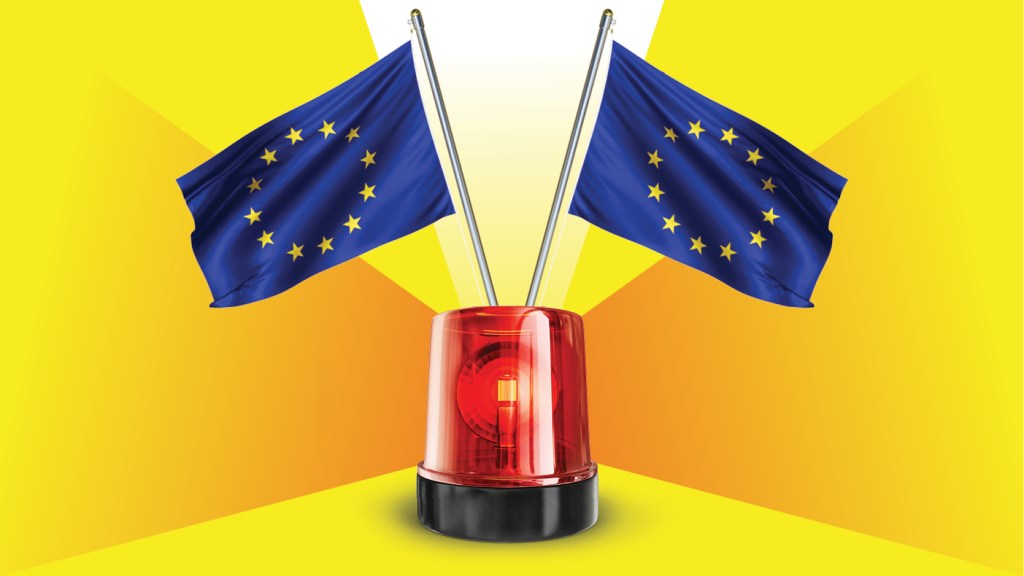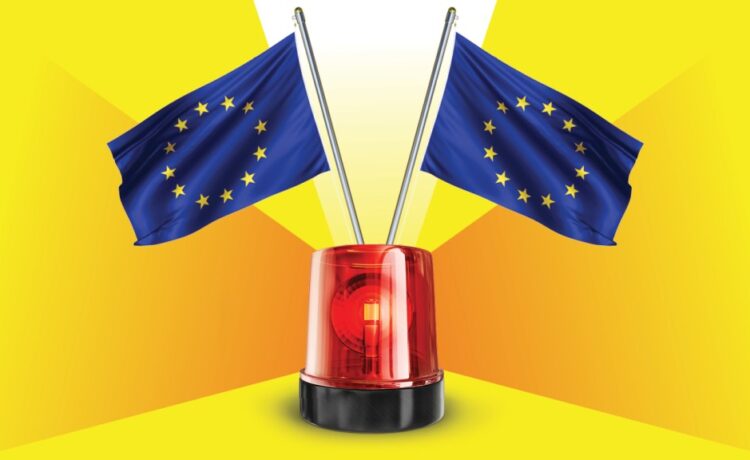
THR Illustration
Europe is staking its claim to be the world’s digital cop, with a series of new laws aimed at regulating the world’s biggest tech companies. Following last year’s Digital Services Act, which targeted abuse on social media, comes the Digital Markets Act (DMA), which went into effect on March 7 and has the much broader goal of combating unfair competition and preventing market dominance by so-called digital “gatekeepers,” a who’s who of Internet behemoths, from Alphabet and Apple to Meta, Microsoft and TikTok. [This week, the European Parliament also passed the AI Act, the world’s first broad legislation regulating artificial intelligence, but those laws won’t fully take effect until mid-2026.]
The DMA is already transforming how big tech does business in Europe, and given that EU digital laws tend to become global standards — what Anu Bradford of Columbia Law School has called the “Brussels effect” — Europe has become a testing ground for the future of digital markets, impacting everything from how video games are sold online to the information available for use in targeted advertising to the ease with which users can communicate between platforms and devices, whether its sending videos from an iPhone to an Android device or texting between iMessenger and WhatsApp.
The legislation is complicated but, in general, platforms designated as “gatekeepers” — those with a market value of €75 billion ($81.7 billion) or annual revenue of at least €7.5 billion ($8.17 billion) within the EU, and at least 45 million monthly end-users on at least one core platform — are required to take proactive steps to ensure their services treat competitors fairly and to allow customers to pick and choose among digital services, whatever hardware or operating system they are using. The DMA will initially apply to six “gatekeeper” companies: Alphabet, Amazon, Apple, TikTok owner ByteDance, Meta and Microsoft.
Instead of waiting to see evidence of market dominance hurting consumers and using traditional antitrust law to correct it — the approach taken by U.S. regulators to reign in big tech — Europe is trying to get ahead of digital markets to ensure, in the words of the European Commission, “a level playing field” for businesses in the digital sector. Europe is going further than the U.S. has when it comes to digital regulation, but not so far as to ban individual services or platforms, as a bill that just past the House of Representatives would do for TikTok if ByteDance refuses to sell its U.S. operations.
In Europe, the message for tech giants is “with power comes responsibility” said EU Competition Commissioner Margrethe Vestager, speaking at SXSW on March 11. And Europe is ready to punish companies that act irresponsibly. The DMA includes penalties allowing the EU to fine first-time DMA offenders up to 10 percent of their company’s total worldwide turnover and double that for repeat infringements. To get an idea of the scale of these punishments: If Meta broke the DMA rules, it could cost the company $13.4 billion (10 percent of the company’s 2023 worldwide revenue of $134 billion) for its first offense.
As if to show it means business, on March 4 the EU levied a €1.8 billion ($2 billion) fine on Apple for unfairly favoring its own music streaming service by forbidding rivals like Spotify from telling users how they could pay for cheaper subscriptions outside of iPhone apps. In a separate antitrust action against Google, the EU filed the company €2.42 billion ($2.64 billion) for favoring its own price comparison shopping service over smaller European rivals.
Both Apple and Google are appealing the penalties.
But in a similar DMA-related dispute with Epic Games, producers of Fortnite, Apple backed down, reversing a previous decision to block an Epic Games app store for iOS that would circumvent Apple’s online stores.
In a tweet on March 9, Epic Games CEO Tim Sweeney said Apple’s reversal marked a “big win for European rule of law.” On its website, Epic Games said it sent a strong signal “that the European Commission will act swiftly to enforce the Digital Markets Act and hold gatekeepers accountable.”
Before Europe’s law even went into effect, and before the full impact of the legislation could be assessed, governments from London to Tokyo were rushing to write their own copycat versions of the DMA. It’s a repeat of what happened with Europe’s General Data Protection Regulation (GDPR) privacy law, enacted in 2018, which became the model for at least 150 similar regulations worldwide, including California’s Consumer Privacy Act.
“Already we’re seeing copies of this Digital Markets Act, or variations of it, appear in places like Japan, the U.K., Brazil, Mexico, even India,” says Bill Echikson, a senior fellow with the think tank the Center for European Policy Analysis (CEPA). “I think, in the democratic world [the DMA] will become the de facto standard.”
Smaller media companies, particularly in Europe, are hopeful the DMA will allow them to break the hold the international giants have on the digital market. Ahead of the legislation, Germany’s top two commercial TV companies, RTL Deutschland and ProSiebenSat.1 launched a joint adtech partnership to offer broadcasters and publishers across Europe the ability to do cross-platform ad campaigns “independent of the U.S. tech giants.”
But Echikson warns the DMA might have the opposite effect and actually help “reinforce the gatekeepers” because the global tech giants will be able to use their dominant position to squeeze out their competitors.
“On DMA, what I’ve been hearing is, the changes Google is making in search, for example, will mean people will need to spend more on advertising to make sure that they stay at the top of the search results, [so] Google could get more business out of this,” says Echikson. “I’m not sure [the DMA] is going to succeed, particularly in opening the market to European competitors.”
The E.U.’s Regulatory Crackdown: The Highlights
July 2021 – Amazon fined €746 million ($888 million) for violating EU data protection rules (GDPR).
September 2022 – Google fined €4.12 billion ($4.13 billion) for using its Android mobile operating system to thwart rivals.
April 2023 – Ireland’s data regulator fined TikTok €345 million ($377 million) for breaking EU data law in its handling of children’s accounts.
May 2023 – Meta fined €1.2 billion ($1.3 billion) for violating GDPR.
June 2023 – Microsoft discloses it has set aside $425 million in anticipation of a fine it expects to receive from Ireland’s data regulator for violations of GDPR by its LinkedIn subsidiary.
March 2024 – Apple fined €1.8 billion ($2 billion) over abusive App store rules for music streaming providers.
(Note: Fines may be reduced or overturned on appeal.)














